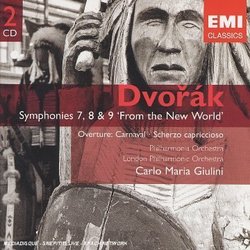| All Artists: Antonin Dvorak, Carlo Maria Giulini, London Philharmonic Orchestra, Philharmonia Orchestra of London Title: Dvorak: Symphonies 7, 8 & 9 'From the New World', Overture Carnaval, Scherzo Capriccioso, Carlo Maria Giulini Members Wishing: 0 Total Copies: 0 Label: EMI Classics Original Release Date: 1/1/2006 Re-Release Date: 5/2/2006 Genre: Classical Style: Symphonies Number of Discs: 2 SwapaCD Credits: 2 UPC: 094635085921 |
Search - Antonin Dvorak, Carlo Maria Giulini, London Philharmonic Orchestra :: Dvorak: Symphonies 7, 8 & 9 'From the New World', Overture Carnaval, Scherzo Capriccioso, Carlo Maria Giulini
 | Antonin Dvorak, Carlo Maria Giulini, London Philharmonic Orchestra Dvorak: Symphonies 7, 8 & 9 'From the New World', Overture Carnaval, Scherzo Capriccioso, Carlo Maria Giulini Genre: Classical
|
Larger Image |
CD Details |
CD ReviewsDvorak at his warmest and most romantic Santa Fe Listener | Santa Fe, NM USA | 02/05/2007 (5 out of 5 stars) "Giulini had no Czech connection to Dvorak and didn't conduct his music as in any way nationalistic--all these performances sound exactly like Brahms. They are warm and romantic, full-voiced, at times a bit more measured than one usually hears. A good touchstone is the slow movement of Sym. #7 (the only work on this double CD played by the London Phil, the rest being with the Philharmonia). Giulini takes it slowly and very sweetly, with a turn toward the meditative--we are in the exact same world as the slow movement of the Brahms First. Some listeners may find the Scerzo and finale underdramatized, but altogehter this is a masterful performance, much like Brabirolli's with the Halle but better played by far.
The Sym. #8 here is one of Giulini's signature recordings. It used to sound a bit thin and still isn't quite up to the fine analog sound of the Seventh, but remastering has helped a lot. The symphony gets the same warm, flexible interpretation as the Seventh, without the sharp contrast one hears in Kubelik or the streamlined refinement of Szell. In spirit it's much like Bruno Walter's famous recording with the Columbia Sym. on Sony; both are cut from the same late-Romantic cloth. Giulini had a great gift for the singing line, and it certainly comes out in the finale's gorgeous cello melody. The Philharmonia always played well for Giulini, and they do throughout in this set. I would be repeating myself a third time to describe the Ninth, which comes off exactly like the earlier two works. The outer allegro movements are more aggressive in this symphony, and Giulini suitably applies more force and excitement. Because the "New World" is a warhorse, modern conductors tend to run thorugh it impatiently. Giulini doesn't, and I am also happy to report that he doesn't manuder through the dNIYA RYBW UB RGW kefi, My only reservation is that warhoses do need something original if the umpteenth performance has a chance of sticking in the mind; this one doesn't, not compared with Fricsay's nervous energy or Talich's complete immersion in Czech style. In all, this is a great bargain set, in very fine sound, and a cherished reminder of what made Giulini both renowned and beloved. " |

 Track Listings (8) - Disc #1
Track Listings (8) - Disc #1